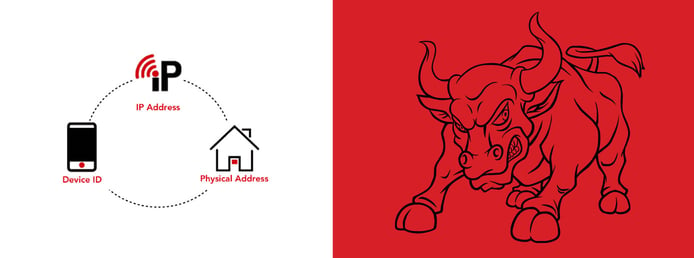
TL; DR: El Toro is taking a new approach to online advertising by pairing physical and IP addresses to target customers and prospects with extreme precision. The company’s offline data assets and proprietary one-to-one marketing technology allow users to leverage programmatic advertising in a revolutionary and quantifiable way. With plans to focus on big data, artificial intelligence, and machine learning in IP and device targeting, El Toro is paving the way for future innovations in the AdTech space.
Cookie-based advertising, a strategy that uses pieces of data to target consumers based on browsing behavior, has become incredibly popular over the past decade.
But lately, marketers have started to lose their appetite for such campaigns — and for good reason.
For one, we know that more than half of the online traffic worldwide comes from mobile devices. And when they’re on those devices, consumers spend the vast majority of their time within apps. The problem is, cookies are sandboxed within apps and unable to track user activity and behavior.
To make matters worse, more than 40% of marketers surveyed in a recent study said cookie-based tracking does not accurately track persistent user identity.
With stats like these, it’s no wonder cookie-based advertising is crumbling. Fortunately, there’s an alternative approach to personalized online marketing that’s generating buzz: IP targeting.
And El Toro, a one-to-one cookie-free IP targeting solution, is paving the way in this new market.

El Toro is connecting businesses with current customers and prospects via a one-to-one approach.
The company is leveraging its offline data assets and patented one-to-one marketing technology to link physical and IP addresses, as well as devices, with incredible precision — allowing advertisers to pursue account-based marketing tactics and CRM targeting, among other strategies.
“With El Toro, advertisers can target their intended online customer base by matching CRM data with IP address locations for effective one-to-one marketing,” said Richard Teachout, CTO at El Toro.
When it comes to innovations, the company has no intention of slowing down anytime soon. With future plans to focus on the role of big data, artificial intelligence, and machine learning in IP and device targeting, El Toro is well-positioned to continue paving the way in AdTech for years to come.
A Data-Driven, One-to-One IP Targeting Solution for Digital Ads
El Toro, headquartered in Louisville, Kentucky, was founded in 2013. Richard said the company initially focused on using the technology for security purposes, helping to identify threats. But the demand wasn’t there, and the company quickly found its niche in AdTech.
“We found our technology was 95+% effective in programmatic marketing compared with our competition in the AdTech world, which was coming in at 7% to 10%,” he said.
With a target consumer established, El Toro then turned to growth. After building a massive database of the U.S. used for tracking all IPs and device IDs down to the square meter, the company had no choice but to focus on big data.
The goal, Richard said, was to keep costs down while finding ways to store increasing amounts of data while ensuring fast performance. To do so, the company transitioned some of its colocation resources to the cloud.

The combination of device IDs, IP addresses, and physical addresses empowers advertisers to target consumers in a whole new way.
“The core of our technology was built on big data, so we became a cloud-first company,” he said. “That gave us major economies of scale in our processing with serverless infrastructure, containerization, big data storage, and data lakes.”
Today, the company’s proprietary technology for mapping IP addresses to physical addresses is able to scale and evolved in its ability to attract target prospects affordably and without the use of cookies.
It also helps advertisers reach specific households of their choice in a highly accurate, affordable, and privacy-centric manner using unique geo-location technology. This technique allows advertisers to place digital ads directly on an individual computer based on the prospect’s home/business address.
Targeting at Scale: From Fortune 100 Companies to SMBs
Richard told us that El Toro was designed to handle the needs of mom-and-pop shops and enterprises alike with its powerful technology for IP targeting, geo-framing, account-based marketing, and outcome analytics.
“We saw major problems with people trying to keep up with and get better at programmatic advertising in ad tech,” Richard said. “So, we built the ad tech platform to allow companies of all sizes to target individuals at scale.”
El Toro is continuously evolving its technologies to quickly process ever-increasing amounts of data. “We will never remain stagnant,” Richard said. “We see a lot of C-level execs going through their own digital transformations trying to catch up, and others stuck with CapX investments in legacy hardware.”
Richard said whether the problem is CapX investments or licensing, it’s crucial that businesses work toward the next generation of technology — because what we see now is only the tip of the iceberg. There’s also an added benefit: Modern technologies, such as cloud computing, often go hand-in-hand with tax breaks.
That said, the El Toro team is fully capable of adapting to the infrastructure and operations of any company or industry. Its technology is suitable for a wide range of customers, including consumer brands, universities, political advocacy groups, nonprofits, and insurers, among others.
For example, a case study found that 19 different political candidates in one Midwestern state trusted El Toro’s patented technologies when targeting voters with digital advertising. Using IP targeting, the candidates were able to reach loyal voters with significant precision, allowing them to deliver digital ads to their homes while they browsed the web. Of the 19 races, 17 candidates won.
In another case, a national retailer turned to El Toro to generate sales during Black Friday and Cyber Monday. El Toro used a range of products to accomplish the customer’s varying objectives.
For instance, Venue Replay was used to capture the device IDs of customers shopping at competitor locations and redirect them to the client’s stores. Digital New Movers, on the other hand, targeted consumers who had moved into new homes. The campaign resulted in more than $5 million in total sales, with nearly $2.5 million created from the Digital New Movers campaign alone.
Beyond Impressions: A Focus on Sales with Quantifiable Results
Over the years, Richard has observed a trend toward assessing the efficacy of a marketing campaign based on click-through rates. But ultimately, he said it’s the return on investment that really matters.
“One of the biggest advantages is the ability to prove ROI,” he said. “Often, with the big boys in advertising — your Facebooks and Googles — you’re leaving it up to them in terms of who you’re targeting and whether the ad campaign even worked.”
With El Toro’s MatchBack Analysis, the company can easily account for the impact of every ad dollar spent via identity resolution, rather than focusing on tracking codes, cookies, and clicks.
For example, using Venue Replay, El Toro can geo-frame a store’s location and pull the device IDs of those within that location from up to six months in the past. The company then maps the devices back to their home using the IP address.
“The unique aspect is being able to prove what’s working without requiring third-party analytics companies or assuming customers will have an implicit trust in a company simply because it’s a big name,” Richard said.
Raising the Bar: Future Plans for Big Data, AI, and Machine Learning
Richard has big plans for El Toro as the company moves into 2020, specifically in the areas of big data, AI, and machine learning.
“We’re getting smarter at letting data lead us to the next product,” he said. “It’s more about the power of data science in advertising, optimizing the business, and leveraging business intelligence to be more efficient.”
Richard said El Toro is continually inventing new products. The advantage of microservices, he said, is that you often realize one step, when combined with another, results in an entirely new product.
“I probably have 20 to 30 products on my R&D bench right now, and we’ll start launching them next year because we’re always finding new ways of doing things,” he said.
HostingAdvice.com is a free online resource that offers valuable content and comparison services to users. To keep this resource 100% free, we receive compensation from many of the offers listed on the site. Along with key review factors, this compensation may impact how and where products appear across the site (including, for example, the order in which they appear). HostingAdvice.com does not include the entire universe of available offers. Editorial opinions expressed on the site are strictly our own and are not provided, endorsed, or approved by advertisers.
Our site is committed to publishing independent, accurate content guided by strict editorial guidelines. Before articles and reviews are published on our site, they undergo a thorough review process performed by a team of independent editors and subject-matter experts to ensure the content’s accuracy, timeliness, and impartiality. Our editorial team is separate and independent of our site’s advertisers, and the opinions they express on our site are their own. To read more about our team members and their editorial backgrounds, please visit our site’s About page.

